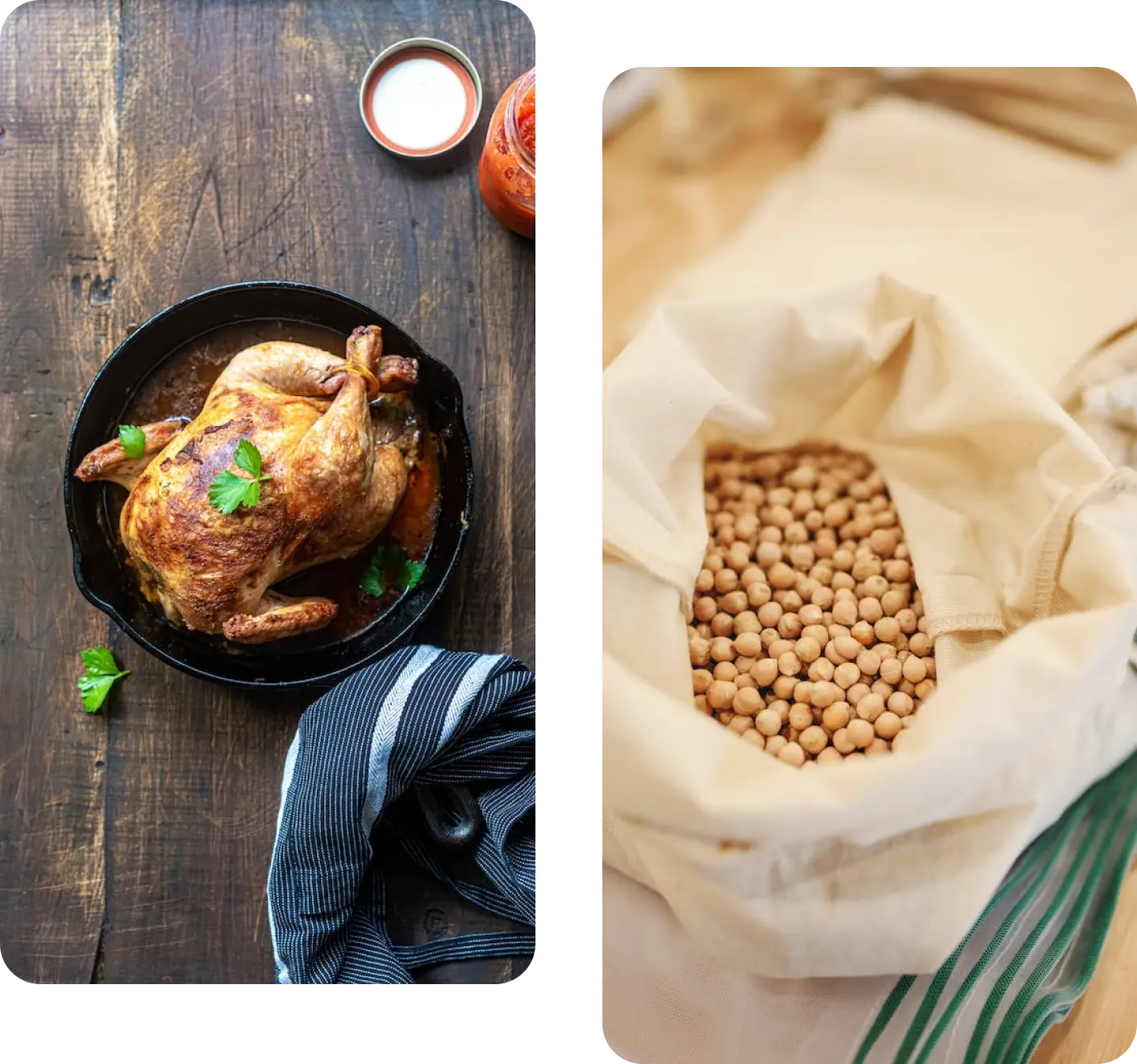Savoring Success: How to Eat Right and Focus on Nutrition After Weight Loss Surgery

If you’ve finally decided to make the big decision to give yourself the gift of weight loss surgery, congratulations!
Undergoing bariatric surgery is a big commitment and one that most of us don’t take lightly. You’ve probably spent months researching different bariatric procedures, and surgeons and know all the pros and cons of what’s to come.
But one big question still remains…
After my weight loss surgery, how do I eat foods that are going to help me lose weight and keep it off?
key takeaways
Your post bariatric surgery life is going to be different in many ways from the life you’ve been living up until now.
From how you look to the way you feel, you are about to embark on a brand new chapter…a chapter that has the potential to be your best one yet.
Let’s make sure your eating habits and diet plan are ready to support it!
Nourishing Your Body: The Fundamentals of Post-Bariatric Nutrition
After undergoing weight loss surgery, one of the biggest changes most bariatric surgery patients will have to make is around their eating patterns and the amount and types of food they eat.
Remember that – even though gastric bypass and gastric sleeve surgery reduce the size of your stomach – the restriction will decrease over time and you’ll have to continue to be cognizant of your balanced diet and eating habits.
Essential nutrients, including proteins, vitamins, minerals, and hydration, are going to always play a crucial role in supporting the body through this transformative journey.
Not only that, but there are going to be certain foods that will quickly cause weight gain as well as physical discomfort if you don’t avoid them.
Let’s break down some of the key factors surrounding your diet and nutrition in this new chapter so you can get a better idea of the importance they are going to play in your long term health and continued weight loss.
Why Protein Matters
Protein takes center stage in post-bariatric nutrition.
It aids in muscle repair, supports a healthy metabolism, and helps prevent muscle loss during weight loss.
Protein Supplements: Consider protein supplements, especially in the initial post-surgery period. Protein shakes, powders, and bars can be convenient options to meet daily protein goals.
Small, Frequent Meals: Consume small, protein-rich meals throughout the day. This approach aids digestion and ensures a steady supply of nutrients.
Greek Yogurt and Cottage Cheese: Incorporate Greek yogurt and cottage cheese into your diet. These dairy products are rich in protein and can be versatile additions to meals or snacks.

Eggs: Eggs are an excellent source of high-quality protein. They can be prepared in various ways, providing versatility in meal planning.
Nuts and Seeds: Include nuts and seeds in your diet for added protein and healthy fats. However, be mindful of portion sizes due to their calorie density.
Protein-Rich Vegetables: Some vegetables, such as broccoli and spinach, are surprisingly high in protein. Including a variety of veggies ensures a nutrient-dense diet.

Poultry and Fish: Opt for skinless poultry and fish, as they are lean protein sources. Bake, grill, or steam them for a healthier cooking method.
Quinoa and Legumes: Quinoa is a complete protein, and legumes like beans and lentils are rich protein sources. These plant-based options are suitable for those with dietary restrictions.
Hydrate with Protein Drinks: Choose protein-infused beverages or add protein powder to your favorite drinks for a hydrating, protein-packed option.
While this is a great starting point for you to consider when choosing what types of protein-rich foods you can incorporate into your regular diet, it’s a good idea for you to talk with your healthcare team as well.
Working with a good nutritionist and primary care provider is going to make sure you can create a personalized meal plan that meets your specific protein requirements and supports your individual recovery journey.
Vitamin and Mineral Supplements: The Powerhouse Duo
Post-bariatric patients are at risk of nutrient deficiencies, making vitamin and mineral supplements a crucial player in your overall post bariatric surgery diet.
Key vitamins like B12, D, and minerals such as iron and calcium are great supplements to prevent deficiencies and support overall health.
Meeting vitamin and mineral needs is crucial for you to prevent deficiencies and support your overall health.
Let’s look at some practical strategies to ensure you get sufficient vitamin and mineral supplementation in your post-bariatric diet:
Follow Healthcare Team Recommendations:
Adhere to the vitamin and mineral supplementation plan prescribed by your healthcare team. They will tailor recommendations based on your surgery type, individual needs, and ongoing assessments.
Take a Multivitamin Supplement:
Choose a high-quality, bariatric-specific multivitamin that includes essential vitamins and minerals. This helps cover a broad spectrum of nutritional needs.
Calcium and Vitamin D:
Include calcium and vitamin D supplements, as these are critical for bone health. Calcium citrate is often recommended for better absorption, and vitamin D aids in its utilization.
B12 Supplementation:
Bariatric patients may require vitamin B12 supplementation, as its absorption can be affected. Sublingual or injectable B12 supplements are common choices.

Iron Supplements:
Iron supplementation might be necessary, especially for gastric bypass patients. Choose iron supplements that are gentle on the stomach or consider intravenous iron infusions if needed.
Vitamin A, E, and K:
Monitor and supplement fat-soluble vitamins (A, E, and K) as needed. These vitamins require dietary fat for absorption, and bariatric patients may have reduced fat absorption.
Why Water Will Help You Win in Your Weight Loss Journey
Proper hydration aids in nutrient absorption. Consuming water regularly throughout the day is going to support the absorption of water-soluble vitamins, keep you feeling full longer and help in your overall health.
But getting enough water can be hard for all of us.
This is why finding ways to stay hydrated is going to take some creativity, particularly for those who have undergone any sort of gastric bypass surgery.


Schedule Your Consult
Explore candidacy. Book a consultation to learn more about your eligibility and take the next step towards your goals.
Crafting a Colorful Plate: Making Meal Time Effective and Enjoyable
Eating high protein foods, making sure you are getting enough vitamins and minerals and staying hydrated are all going to be key ingredients in maintaining a healthy weight over the long run.
Weight loss surgery brings big changes to your lifestyle.
From what you can eat to how you eat it, you will want to take time to devise eating strategies that will not only help you work toward your goals but also allow for meal times to be an enjoyable experience.
In fact, a recent article recent article published by the Journal of Obesity and Metabolic Syndrome confirmed that studies have proven that the amount of food eaten, type of food consumed (macronutrient composition), and meal timing of meals are all key components of weight-management strategies.
Are you still unsure how to put these findings into practice when choosing your own diet and eating behaviors? Let’s look at some specific ways you can make sure that meal planning and meal timing is going to aid in your weight loss success while also being something you look forward to.
1. Portion Control and Mindful Eating Habits is Key to Weight Management
After bariatric surgery, the stomach’s capacity is reduced, emphasizing the need for smaller, nutrient-dense meals. Practicing your portion control is not only going to keep you from overeating, but it’s also going to keep your gut healthy and keep you feeling your best.
It’s also a great idea to get into the habit of practicing “mindful eating.” Eat slowly and think about the food you’re putting in your mouth. Is it healthy and tasty? By learning to savor each bite, you will begin to appreciate the foods you are choosing and will promote a healthier relationship with food.

2. Plan for Balance
While it may be a bit challenging at first, make time to create well-rounded meals that include a variety of nutrient-dense foods.

Not only will this kind of diet aid in weight management, but it will also keep your body well-nourished and healthy.
Eating solid foods such as raw vegetables, colorful fruits, whole grains, and healthy fats are going to give you a diverse range of essential nutrients.
Though they may be tempting, you should not eat foods that are high in fat or processed. These types of foods will lead to regaining the weight you’ve worked hard to lose and are hard to digest after your surgery.
3. Be Mindful of Your Chewing Habits
After bariatric surgery, how you chew your food is also pivotal for efficient digestion and overall well-being.
Thorough chewing initiates the digestive process in the mouth, making your solid foods into soft foods and thus easier for your now-limited stomach capacity to process.
Mindful chewing is going to help prevent discomfort, promote a sense of fullness, and contribute to weight management by signaling satiety to the brain.

When you eat slowly, you also enhance your eating experience and learn to savor the flavors and textures of each bite.
Taking small, slow bites and putting utensils down between bites are practical tips for incorporating mindful chewing into post-bariatric eating habits, ensuring a smoother digestive process, and supporting long-term success in maintaining a healthy lifestyle.
4. Know When to Say When
For many people who have struggled with obesity, food has become more than just a way to fuel their body.
After surgery, it’s going to take some time and patience on your part to train your brain how to respond to your body’s hunger signals. But in time, as you begin to recognize hunger and fullness cues, you’ll know when to stop eating and be satisfied with your meal.
5. Labels Are Your Friends
Another great way to make sure your body is getting adequate and appropriate nutrition is to educate yourself on food packaging labels.
Food labels can provide you with a wealth of information, giving you detailed insights into the nutritional content of the products you consume.
Understanding the information on labels empowers you to make informed choices, ensuring your body receives the necessary nutrients without compromising your post-surgery goals.
When looking at a food label, focus on things like serving sizes, calorie counts, protein content, and the presence of essential vitamins and minerals. If labels are intimidating to you, consider talking with a nutritionist or spend some time on the FDA’s website, learning more about why certain nutritional facts are inherent to a balanced and sustainable diet.
PRICING & COSTS
Explore surgery expenses and pricing details to better understand the associated costs for your medical procedure.

Celebrate Success! Savor Your Achievements and Milestones
Embarking on the transformative journey of weight loss after bariatric surgery is a remarkable achievement in itself. While the road may – at times – be rocky, you must also recognize the work you’ve put in and the commitment you’ve made.
Remember…your journey to weight loss surgery didn’t happen overnight.
It makes sense that your new journey will take some time as well. Be patient with yourself. Try coming up with ways to propel yourself forward, not beat yourself up when your progress isn’t as linear or fast as you’d like.
Here are some ideas for celebrating those milestones that have worked for others:
Treat Yourself to New Wardrobe Essentials: As you shed pounds and your body transforms, investing in a few key clothing pieces that showcase your new figure can be a rewarding and confidence-boosting celebration.
Host a Healthy Dinner Party: Gather friends and family for a celebratory meal featuring delicious and nutritious recipes. It’s a great way to showcase your commitment to a healthier lifestyle while enjoying the company of loved ones.


Document Your Journey: Create a scrapbook or digital journal chronicling your weight loss journey. Include photos, reflections, and milestones, providing a tangible representation of your achievements.
Plan an Active Getaway: Consider organizing a weekend getaway focused on outdoor activities or fitness retreats. It not only celebrates your commitment to an active lifestyle but also offers a refreshing change of scenery.
Pamper Yourself with a Spa Day: Indulge in a spa day to relax and rejuvenate. Treatments like massages, facials, or a day at the sauna can be a luxurious way to reward yourself for reaching significant milestones.
Invest in Fitness Gear: Upgrade your workout wardrobe or invest in new fitness equipment to enhance your exercise routine. Feeling good in your workout gear can contribute to a positive mindset during physical activity.


Join a Fitness Class or Club: Celebrate your progress by engaging in a new fitness challenge. Whether it’s a dance class, yoga workshop, or running club, joining a group activity adds a social component to your wellness journey.
Create a Healthy Recipe Book: Compile a collection of your favorite healthy recipes that have become staples in your post-bariatric surgery diet. Share this personalized cookbook with friends or family who may also benefit from nutritious meal ideas.
Celebrate Non-Scale Victories: Recognize achievements beyond the scale, such as increased energy levels, improved mobility, or successfully completing a physical challenge. These victories are just as significant on your wellness journey.
Organize a Virtual Support Group Celebration: Connect with others who have undergone similar experiences by hosting a virtual celebration within your support group. Share stories, milestones, and tips, fostering a sense of community and encouragement.

Weight loss success after bariatric surgery is a marathon, not a sprint. Remind yourself that you are in this for the long haul, that you are making changes that have been deeply rooted in you for decades.
Be kind to yourself and watch as your transformation continues to take place, long after your surgery is over.
Are You Ready to Start Your Transformation? We Are Waiting for You!
Choosing to have weight loss surgery is a big decision. And at Mexico Weightloss Surgery Center we are committed to helping it be one of the best decisions you’ve ever made.
From pre-op consultations and travel arrangements to post-op nutrition counseling and follow up care, our dedicated team of medical professionals is ready to educate and empower you on your post-surgery path. Coaching after weight loss surgery Mexico is also available for continued guidance.
Reach out to us today and start embracing a lifestyle that prioritizes your health, vitality, and long-term well-being.
Choose to have your weight loss surgery in Mexico. Your transformation starts here.
Mexico Bariatric Experts
Uncover the Renew Bariatrics Difference with Mexico Bariatric Experts – Your personalized journey to transformative well-being.

FEATURED BLOGS
How to Choose Mexico Bariatric Surgeon
Concerns about having a bariatric procedure is a normal and expected element of the decision. These worries are…
Read MoreWhich Bariatric Surgery is Best?
Obesity is one of the most common health issues in America. Obesity may further lead to a number of…
Read More
